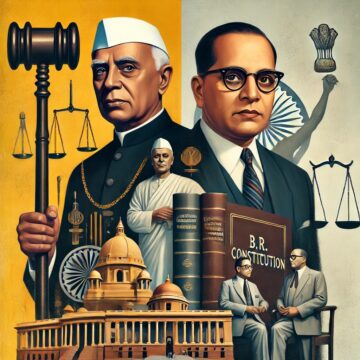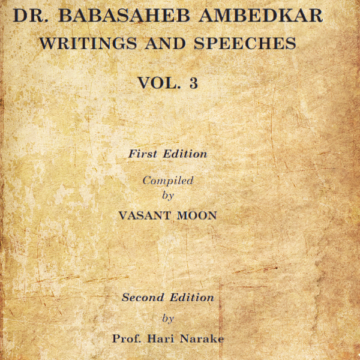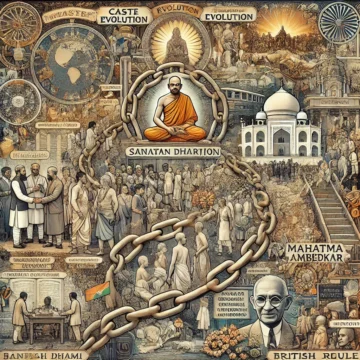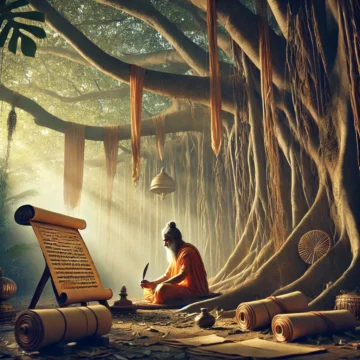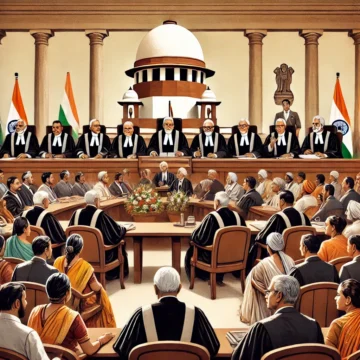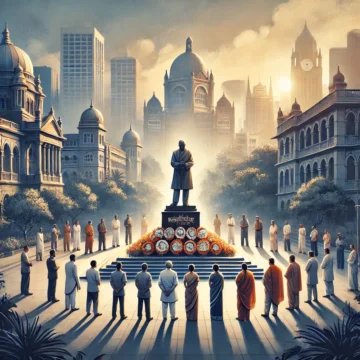Explore the ancient social structures defined by the Manusmriti and their implications for modern societies. This blog delves into the varna system, examining how traditional roles and duties align with today's dynamic societal norms and the ongoing quest for equality and social mobility.
Tag: caste system
Ambedkar’s Buddhist Political Move: Divergence from Gandhi on Caste Issues
Ambedkar's Buddhist Political Move was not merely a spiritual choice but a profound critique of Hindu caste inequalities. Influenced by his differences with Gandhi and frustrations with Nehru's policies, this move marked a strategic realignment towards more assertive Dalit activism, fundamentally challenging both traditional Hindu structures and contemporary political frameworks.
Ambedkar’s Buddhist Conversion: Challenging Caste with New Faith
Dr. B.R. Ambedkar’s conversion to Buddhism was a monumental act that not only shifted religious identities but also challenged entrenched caste hierarchies in India. His decision, rooted in a profound critique of the caste system as institutionalized in Hindu doctrines, sparked a significant dialogue on equality and social reform.
Manusmriti Critique of Ambedkar and Its Modern Relevance
Dr. B.R. Ambedkar's critique of Manusmriti dissects its role in reinforcing outdated social norms and caste-based inequalities. This blog explores how despite its historical significance, Manusmriti's influence on modern Hindu practice and legal frameworks is minimal, urging a reflection on societal evolution towards more inclusive and equitable norms.
Ambedkar’s Criticism and the Manusmriti: Insights and Impact
Dr. B.R. Ambedkar’s criticism of Manusmriti highlights its role in institutionalizing caste hierarchies and gender inequalities. This blog explores the evolution from the varna system to a rigid caste framework, shaped by colonial policies and misinterpretations. It also examines modern legal reforms inspired by Ambedkar’s vision, promoting justice and equality in contemporary India.
Ambedkar’s Criticism of Manusmriti: A Modern Review
Dr. B.R. Ambedkar's critique of Manusmriti sheds light on its historical role in institutionalizing caste and gender disparities. This blog explores his viewpoints, contextualizes the Manusmriti within Hindu traditions, and examines its evolving relevance. By addressing these complexities, we reflect on Ambedkar's enduring impact on India's legal and societal frameworks, fostering equality and justice.
Sanatan Dharma and Caste Evolution: Navigating the Pros and Cons
Explore the intricate layers of caste evolution within Sanatan Dharma through historical periods like the Mughal era and British colonial rule. Witness how figures like Mahatma Gandhi and B.R. Ambedkar shaped the modern perceptions and roles within the caste system, and delve into the ongoing debates over nepotism and caste-based privileges.
Narayana Guru: Beacon of Equality and Enlightenment in Modern India
Commemorating Narayana Guru's birth anniversary, this blog delves into his transformative journey from early struggles in Kerala to becoming a beacon of equality. We explore his spiritual enlightenment, groundbreaking social reforms, and enduring philosophies that continue to inspire movements for justice and unity in modern India.
Sanatan Dharma and Manu Smriti: Ancient Wisdom and Modern Insights
Explore the Manusmriti's nuanced guidance on Dharma, a cornerstone of Hindu tradition. This ancient text elucidates the roles and duties across society's strata, addressing moral and ethical conduct while debunking myths about caste and birth. Our examination reveals its profound influence on both past civilizations and its relevance in modern discourse.
Caste System and Supreme Court Judgment
Explore the Supreme Court of India's landmark judgment on reservation policies, aimed at addressing disparities within the system. This blog delves into the historical context, implications, and potential resistance, offering insights into how these changes might reshape India's socio-economic landscape and promote true social justice.
Sanatan Dharma and Caste Divide And Ramabai killings
In exploring the Ramabai killings within the context of "Sanatan Dharma and Caste Divide," we confront the ethical dilemmas posed by the intersection of ancient dharmic teachings and modern societal structures, shedding light on the need for redefining traditional values to bridge deep-rooted social divides.



